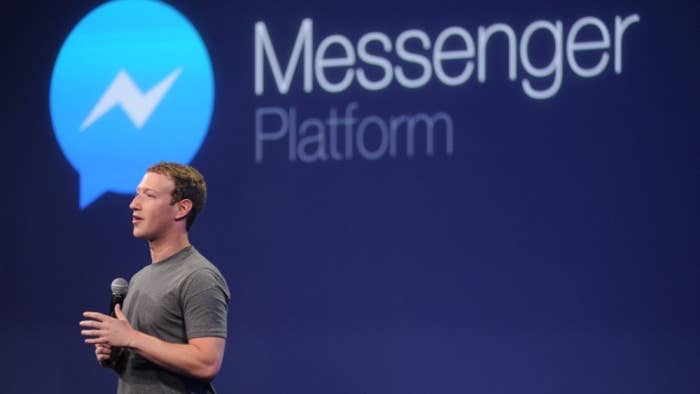
Facebook’s F8 developer conference Tuesday was a tale of two platforms. The first, Facebook, announced a new API (application programming interface) for building software applications that allow high-quality cameras to plug into the company's live video streaming product. The second, Messenger, introduced an API of its own: one that will allow companies ranging from retailers to weather apps to build their own bots for Messenger’s 900 million users.
On the surface, it seemed like a banner day for both. But in context, the news hinted how much of a future-facing bet Facebook is placing on Messenger.
Facebook proper, without question, is the company’s present. The number of people using it grows every quarter and business is booming. But, as The Information reported last week, Facebook is currently experiencing a significant decline in “original” sharing – the stuff you post to Facebook yourself rather than resharing from others. Facebook is working hard to reverse this trend. That’s why we’re seeing more call-to-action prompts encouraging us to post to our timelines. It’s also why the company has been pushing live video so hard. Since live video is typically created on the fly, its posting threshold is far lower than that of produced video, which requires editing resources and the like. It's easy to create, easy to share.
The decline in original sharing on Facebook represents a real competitive threat for the company since one reason people visit its platform is to consume original content. Facebook’s big Live API announcement was fielded as one possible solution to this existing problem. The company’s Messenger announcement, on the other hand, was about what’s next for the company.
Facebook has long been a platform for discovering what's already happened — like a photo of your day at the beach, a news story, or even a Live video (which tend to have more views after the fact than while actually live). With Messenger bots, it's becoming a platform for doing. It hopes you will accomplish things in real time with bots — book flights, buy clothes, ask about the weather.
Facebook Messenger head David Marcus told BuzzFeed News that bots are likely to replace apps “for a lot of use cases." If he's right, Facebook could use them to extend its reach even deeper into the fabric of our daily lives. Clearly, the company imagines Messenger as a premier destination on mobile devices, frequented by people looking for a broad spectrum of interactions with friends, family, businesses, and services. And listening to Marcus, it's not an implausible vision. Imagine a scenario in which a chat among friends about a winter break trip evolves into a planned vacation with the assistance of travel-booking bots.
The advantage of interacting with businesses on Messenger is you are already logged in when you talk to a new company or service (Facebook handles the authentication) and because it’s a messaging thread, the companies you’re interacting with are likely to know more about you since your past communication with them persists within the thread. So, if you’re messaging with an airline with whom you’ve previously communicated and you say “change my flight,” you won’t have to give them your frequent-flier number again. Marcus would like to see Messenger facilitating interactions like that.
Marcus’s vision of replacing apps with bots would seem like wishful thinking if apps were working really well for businesses and services. But in many cases they’re not. For some companies, the migration from desktop to mobile has been a difficult one to weather. Eighty-four percent of time spent in non-native apps on mobile devices is concentrated in just five apps, according to Forrester. So if you’re not in that “top five,” you are essentially screwed.
Facebook, the king of the “top five” apps, is already working to create ways for companies to reach lapsed customers through its main app. For publishers, for instance, Facebook created a product called Instant Articles (BuzzFeed is a partner), that hosts stories natively inside Facebook and loads them fast. For commercial businesses, Facebook added support for e-commerce transactions.
2005: "search for us on Google" 2010: "search for us in the App Store" 2016: "search for us in Messenger"
Facebook wants to take this a step further with Messenger. It doesn't want Messenger to be a channel for businesses to reach their customers, it wants it to be the channel where you go to do absolutely everything. And this is how Facebook rules long-term — by conquering a land where sharing doesn’t matter.
